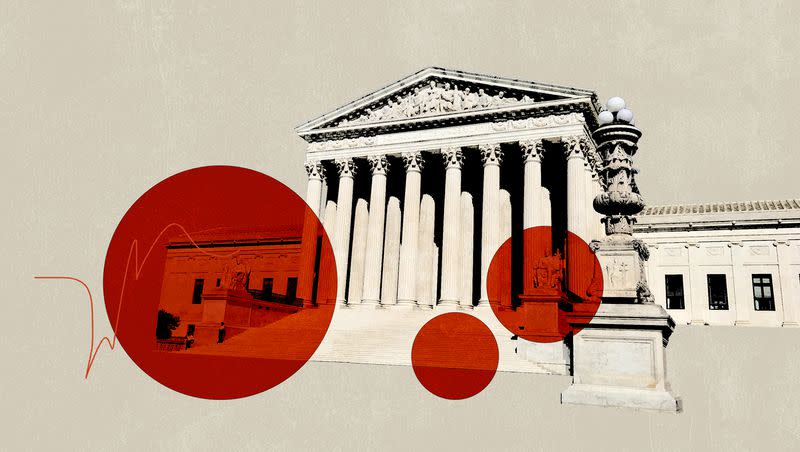The Supreme Court battle conservatives have been waiting for

The Supreme Court on Wednesday heard a pair of cases that could disrupt the balance of power in Washington, D.C., making it harder for federal agencies to impose new rules and regulations without getting them passed by Congress first.
In Relentless v. Department of Commerce and Loper Bright Enterprises v. Raimondo, the court is considering whether to repeal a 1984 decision that gives broad authority to federal officials.
Without it, agency leaders will have a harder time creating and enforcing regulations related to the environment, health care, religious freedom and other issues, unless those regulations are clearly related to what’s actually written into a law.
Congress, meanwhile, would face pressure to pass more detailed laws and to stop relying on federal agencies to figure out how to achieve goals like reducing the cost of health care or cleaning the air.
Related
Religion cases are notably absent from the Supreme Court’s fall schedule. Is that a good thing?
Sen. Mike Lee wants to restrain the administrative state — aka ‘the swamp.’ Here’s how
Supreme Court cases challenge Chevron
The two cases heard by the Supreme Court on Wednesday center on the work of commercial fishermen in New Jersey and Rhode Island.
In each case, the fishermen argue that a federal law governing fisheries in the U.S. was improperly interpreted and applied when it was used to require them to transport and pay monitors tasked with researching overfishing.
They say that “the Magnuson-Stevens Act does not directly authorize the government to force them to pay for the $700-a-day monitors on trips that often last several days,” according to The Washington Post.
Both groups of fishermen lost in a federal appeals court because the judges, citing a 1984 Supreme Court ruling called Chevron v. Natural Resources Defense Council, gave federal regulators broad authority to interpret the Magnuson-Stevens Act.
“Congress has delegated broad authority to an agency with expertise and experience within a specific industry,” wrote Judge Judith Rogers in her ruling in Loper Bright Enterprises. “Although the Act may not unambiguously resolve whether the Service can require industry-funded monitoring, the Service’s interpretation of the Act as allowing it to do so is reasonable.”
The fishermen appealed to the Supreme Court, which agreed to hear both cases. The justices will consider the specific circumstances of fishery regulation, and they will also weigh whether the Chevron precedent gives federal agencies too much power.
What’s at stake?
If the Supreme Court issues broad rulings in favor of the fishermen and overturns Chevron, the decisions will hold significant implications for a range of industries.
Almost overnight, it would become harder for federal agencies to justify rules related to everything from environmental protection to the work of religious organizations unless they could point to specific language in the laws passed by Congress allowing for their actions.
“Discarding (Chevron) could threaten regulations in countless areas, including the environment, health care, consumer safety, nuclear energy and government benefit programs. It would also transfer power from agencies to Congress and the courts,” according to The New York Times.
Chevron’s supporters, including members of the Biden administration, criticize this potential change, arguing that federal officials need the authority to interpret and apply the broad language written into the laws passed by Congress.
Without that authority, the government is less equipped to respond quickly to emerging problems, they say, according to The Washington Post.
Meanwhile, opponents of Chevron argue that it has enabled the government to ignore valid criticism and left business owners like the fishermen with few options even when they can afford to go to court. They want to see the Supreme Court rein in federal agencies’ ability to make new rules and regulations without congressional oversight.
“The reality is that Chevron has already proven itself unworkable, and its corrosive effects on our separation of powers have lingered long enough,” wrote Paul Clement, an attorney for the New Jersey fisherman, in a court filing, per The Washington Post.
Mark Rienzi, president and CEO of the Becket Fund for Religious Liberty, told the Deseret News in September that the Chevron precedent was at the root of a large share of recent faith-related issues.
“Administrative agencies have been at the forefront, in recent years, of imposing burdens on religious liberty,” he said.
Sen. Mike Lee, a Republican from Utah, commented on the Supreme Court cases Wednesday on X, arguing that the Chevron doctrine has disrupted the relationship between voters and government decision-making.
“Hardworking Americans can vote against lawmakers they don’t like. But — unlike big corporations — they have no effective means at their disposal to influence federal agencies. Consequently, voices of the rich and powerful are heard, while all others are silenced,” Lee said.
As Lee’s post makes clear, the current cases overlap with a broader push against the so-called “administrative state,” which former President Donald Trump has repeatedly criticized. Trump’s 2024 presidential campaign includes plenty of criticism of government agencies that interfere with Americans’ lives.
Will the Supreme Court overturn Chevron?
During oral arguments Wednesday, the Supreme Court justices sparred with attorneys representing the fishermen and the Biden administration over what repealing the Chevron doctrine would mean for the country.
Conservative justices appeared interested in overturning the Chevron precedent or at least limiting its application, according to The New York Times.
“Conservative justices said courts must use the ordinary tools of statutory interpretation to decide what laws mean without giving decisive weight to agencies’ views,” the Times reported.
The court’s three liberal justices, on the other hand, expressed concern about giving the legal system more power to interpret at-times confusing policies.
“My concern is that if we take away something like Chevron, the court will then suddenly become policymaker,” said Justice Ketanji Brown Jackson at one point during oral arguments, which lasted more than three hours.
The court’s rulings in the two cases are expected before the end of June.

